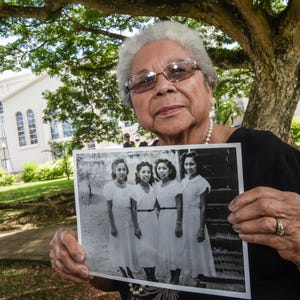With its mix of historical fiction and interviews with wartime survivors, “An American Shame: The Abandonment of an Entire American Population” by Ralph Stoney Bates Sr., describes the brutal consequences of the U.S. military’s decision to surrender Guam without a fight at the beginning of World War II.
Many of the stories in the book will be familiar to readers on Guam: the evacuation of military dependents and contractors weeks before the Japanese attacked the island; the brief stand-off at the Plaza de España; the involvement of interpreters from Saipan; the suffering of those who hid American sailor George Tweed; the forced march to Manenggon and the massacres toward the end of the occupation.
Bates tells these stories by weaving known facts with what he describes in the book as “conjured conversations,” allowing for more thorough character development. He takes the unusual approach of providing transparency — at the beginning of each chapter, readers know whether the material is derived from newspaper articles, books, historical documents or “conjured conversations designed to support the facts and to provide a story flow.”
The book’s political message also is familiar to residents of Guam. Bates addresses post-war confiscation of land by the military and limited citizenship rights, such as the inability to vote for president.
“The naval governors and the Japanese and the Spanish before them all tried to mold the Chamorros into what they felt a citizen should be,” Bates said. “It is amazing to me how they could remain so loyal to a country that had written them off.”
Neither Bates, a retired Marine Corps major, nor his researcher wife, Lyn Bates, had any ties to Guam when they arrived here to gather information for a book in 2014. Bates’ first book, “Short Rations for Marines,” was an anthology of short stories about the Marine Corps. One of the selections was written by former Guam Police Department Chief Adolf P. Sgambelluri and centered on the wartime exploits of his father, Adolf C. Sgambelluri.
The elder Sgambelluri worked as a police officer under the Japanese administration. According to his son, many fellow Chamorros at the time considered him a collaborator, but he was actually a double-agent.
Bates and his wife thought the story would make a good book, so they came to the island and spent three weeks at the Micronesian Area Research Center. They realized they had a good foundation for a book, but not the one they’d set out to write. Instead, Bates said, they were drawn to the story of how the United States failed to fortify the island prior to the invasion, leading to a planned surrender and years of tragedy for the Chamorros left behind.
“We can write a book,” Bates recalled telling his wife, “but it has got to be about the people of Guam.”
In 2015, the Bateses sold their home in South Carolina and traveled back to Guam. They spent five months interviewing survivors and their descendants, chronicling wartime atrocities and learning about peacetime inequalities.
Bates said he and his wife wanted to write the book to “document the heroism of the people of Guam and depict how Guam got in the situation it is in today.” They also wanted to write a book that would educate military people stationed on Guam about the history of the island.
“We’ve found a lack of basic understanding about the people of Guam,” Bates said. “The young men and women who come here should really be aware of the people.”
In addition to the elder Sgambelluri, prominent characters include Agueda Johnston, Joaquin Aflague Limtiaco, Tomas “Tommy” Tanaka, Juan Unpingco Pangelinan and Antonio Cruz Artero.
“These are the people we developed, and they all tied into one another,” Bates said.
At the conclusion of the novel, Bates details the couple’s journey to Guam and describes interviews with the survivors and their family members who helped them gather information for the book. He also addresses the quest for self-determination.
“Let’s be realistic. The United States is never going to give up Guam,” he wrote. “It may continue to subjugate its people, it will continue to seize private property for military use, but it’s not going to give up the territory. It might not even grant it commonwealth status. Congress and the American people choose instead to ignore the people of Guam.”
At the end of the book Bates explains that, according to his research, the decision to not defend Guam was made at the highest levels of the U.S. government. As a 26-year Marine Corps veteran, he said writing the book was a challenge for him.
“Being a career Marine, it was arduous for me to criticize the country I have fought for and defended for so many years. Many of my friends died to serve its national goals,” he wrote. “It is still the country that I love, and I feel strongly about upholding its honor and its traditions, especially its military traditions. But, this country, did in fact, abandon the Americans of Guam in 1941.”
The book is available on Amazon.com for $22, or $4.50 for the Kindle edition. Bates’ other books include “Short Rations for Marines,” “A Marine Called Gabe,” and “Back Step,” with Burnard Winburn.




No comments:
Post a Comment